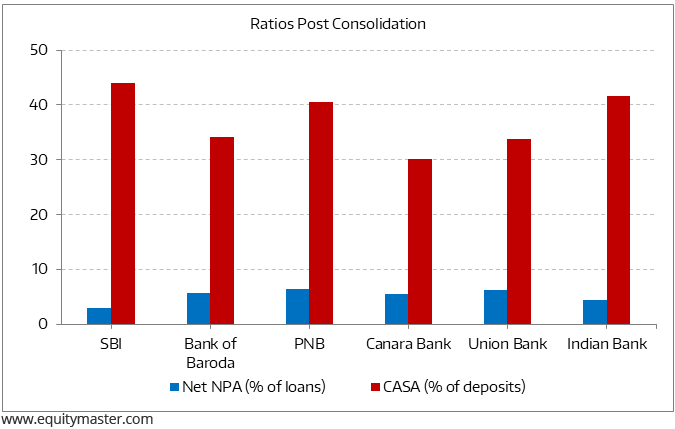India's Third Giant Leap
This Could be One of the Biggest Opportunities for Investors
- Home
- Todays Market
- Indian Stock Market News April 1, 2020
Indian Indices Extend Fall; Kotak Mahindra Bank & Tech Mahindra Top Losers Wed, 1 Apr 12:30 pm
Share markets in India are presently trading deep in the red. Benchmark indices extended losses, tracking weak global cues as markets sentiments turned negative over the rising fear of economic depression, sparked by the coronavirus pandemic.
The BSE Sensex is trading down by 1,064 points (down 3.5%), while the NSE Nifty is trading down by 304 points (down 3.6%).
The BSE Mid Cap index and the BSE Small Cap index are trading down by 2% and 0.8%, respectively.
All sectoral indices are trading on a negative note with stocks in the banking sector, energy sector and IT sector witnessing most of the selling pressure.
Gold Prices are currently trading up by 0.1% at Rs 43,261.
Speaking of falling stock markets amid the coronavirus crash, the ongoing lockdown is a great opportunity to build your wealth of investing knowledge.
In order to help you learn as much as you can about the stock markets, we are giving you completely free access to our two most popular learning courses...
- HYPERLINK "https://www.equitymaster.com/learning-course/derivative-vid-list.aspx" DeriVantage: Learn the secrets of Derivative Trading, at your convenience
- HYPERLINK "https://www.equitymaster.com/learning-course/equitymaster-secrets-vid-list.aspx" Equitymaster's Secrets: Be The Best Value Investor!
Do check them out and make the most out of it.
In news from the banking sector, shares of public sector banks, including State Bank of India (SBI) and Punjab National Bank (PNB) are trading lower today as the government's proposed PSB merger scheme came into effect from today.
The consolidation, that will merge ten PSBs into four, comes at a time when the country and financial system is grappling with adverse fallout of the COVID-19 pandemic.
The Union Cabinet had approved the consolidation to build mega banks to create more efficient and bigger public sector banks in the challenging environment to meet the credit needs of a growing economy and to achieve operational efficiency by scale of business.
Effective from today, Oriental Bank of Commerce (OBC) and United Bank of India (UBI) will merge into PNB.
Mumbai-headquartered Union Bank, on the other hand, will absorb Andhra Bank and Corporation Bank. Bengaluru-headquartered Canara Bank will take Syndicate Bank, and Indian Bank will acquire Allahabad Bank.
As per reports, each of these amalgamated entities with scale and national reach would have a business of over Rs 8 trillion.
Following the consolidation, there will be seven large public sector banks (PSBs), and five smaller ones.
There were as many as 27 PSBs in 2017. The total number of public sector banks in the country will come down from 18 to 12 beginning next financial year.
Last year, Dena Bank and Vijaya Bank were merged with Bank of Baroda. Prior to this, the government had merged five associate banks of SBI and Bharatiya Mahila Bank with the public sector bank.
Speaking of PSBs, which banks look the best match post the latest matchmaking of PSU banks?
Needless to say, most investors would also be worried about the level of NPAs and current and savings accounts (CASA) of the merged entities.
Lower NPA ratio and sustenance of high CASA, in the future, could signal the banks' fitness levels to lend more.
But what could go unnoticed is the efficiency potential of the merged entities.
Post-merger, the employee per branch ratio of the consolidated PSU entities could be in the range of 7 to 9 per branch. This would be almost half that of their private sector counterparts like HDFC Bank and Kotak Bank.
India's Top 6 Public Sector Banks Are Getting Fitter
HYPERLINK "https://www.equitymaster.com/5minWrapUp/charts/index.asp?date=09/03/2019&story=1&title=Indias-Top-6-Public-Sector-Banks-Are-Getting-Fitter&utm_source=TM&utm_medium=website&utm_campaign=MCOM&utm_content=market-commentary" https://www.equitymaster.com/5minWrapUp/charts/index.asp?date=09/03/2019&story=1&title=Indias-Top-6-Public-Sector-Banks-Are-Getting-Fitter&utm_source=TM&utm_medium=website&utm_campaign=MCOM&utm_content=market-commentary < >
>
Leaner operations would mean use of technology to support growth.
So, we would not be surprised if the PSU entities leverage technology at a much bigger scale than their private sector peers, in a few years.
Moving on to news from the pharma sector, Biocon share price is in focus today. Stock of the company jumped 5% today after the company's insulin manufacturing facility In Malaysia received the Establishment Inspection Report (EIR) from the US health regulator.
The company in a regulatory filing said that Biocon Sdn Bhd has received the EIR from the US Food and Drug Administration (USFDA) for the pre-approval inspection (PAI) of its insulin manufacturing facility in Malaysia, for insulin glargine.
The inspection was conducted between February 10 and February 21, 2020.
The company further said, the inspection has been closed with a voluntary action indicated (VAI) classification in the EIR, for the three observations issued at the conclusion of the inspection in Feb 2020.
Meanwhile, Jubilant Life Sciences' wholly owned subsidiary - Jubilant Pharma has received the EIR with voluntary action indicated status for its Solid Dosage Facility at Salisbury, Maryland USA in respect of the inspection conducted by the USFDA from February 24, 2020 to February 28, 2020.
Jubilant Life Sciences share price is presently trading up by 5.6%.
To know what's moving the Indian stock markets today, check out the most recent share market updates here.
For information on how to pick stocks that have the potential to deliver big returns, download our special report now!
Read the latest Market Commentary


Equitymaster requests your view! Post a comment on "Indian Indices Extend Fall; Kotak Mahindra Bank & Tech Mahindra Top Losers". Click here!
Comments are moderated by Equitymaster, in accordance with the Terms of Use, and may not appear
on this article until they have been reviewed and deemed appropriate for posting.
In the meantime, you may want to share this article with your friends!